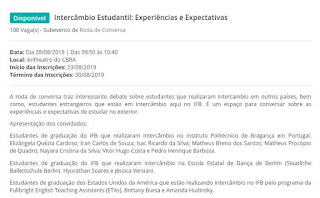This blog describes my experience as an English Teaching Assistantship at a Brazilian University. My personal experiences described only reflect my thoughts as I go on this crazy adventure!
Tuesday, January 9, 2018
Correcting Misconceptions
My teachers used to always say- if you have a question, then somebody may have the same question. While applying for the Fulbright ETA position I believed a lot of misconceptions. As I begin to prepare for leaving and have started talking to the other Fulbright Fellows, I’ve started to see a lot of the corrections to these misconceptions, and I wanted to share. If you’re considering applying for a Fulbright then this may be helpful!
1. You have to be from an Ivy League school to be accepted
When I began my first skype call with the twelve other Fulbrighters who would also be placed in my Brazilian state, Parana, I was intrigued to hear where each of the students were from and had attended University. To my surprise, most of my co-teachers did not attend an Ivy League University, only one did. All of us current Fulbright ETAs for Brazil also have a Facebook group, which is by far one of the most helpful things in this process, and I took a peek to find out where others had studied. I thought that I would be the only Fulbrighter coming in with a University name not instantly recognized, but instead I found the opposite. Although I’m still intimidated by how intelligent some of my new acquaintances are as I talk to them, it is very reassuring to remember that by winning the award we are all one group of nerds excited to teach and travel.
2. You need to speak the language fluently for the country you are applying to
When I had first applied for a Fulbright I aimed to travel to a Spanish speaking country. I took Spanish throughout high school and into college, mixed with the fact that my mother is fluent, and this was my go-to second language. Some countries for the Fulbright require or recommend a language evaluation, and if you have any proficiency or beginning level understanding then I would recommend completing an evaluation, which includes reading, writing, and speaking portions. Once I began to apply for Brazil I was very apprehensive that I would be rejected because I did not know Portuguese. Each country provides a description of the ETA general recommendations for applying to their country, and Brazil listed that a proficiency in a romance language was suggested. Moral of the story is that I ranked as high intermediate for my Spanish levels, and I was able to submit these scores for my Brazil application. There are other factors when applying and you shouldn’t be intimidated out of applying just because you’re unsure that your language proficiency will meet their ideals.
3. You need to be an English or Education major to qualify
As I scanned through the other Fulbrighter’s facebook pages for their universities, I also took note of their majors. I had been under the assumption that only TESOL, English, and Education majors apply for an ETA position. Instead, I found majors such as: Anthropology, Business, English, Portuguese, Spanish, International Relations, International Media Studies, Sociology, Neuroscience, Geography, and Linguistics. This is just to name a few!
4. You need a 4.0 to be considered
One of my biggest hesitancies when applying for the Fulbright was that I wouldn’t be considered because I was not from a “top name school” with a 4.0 GPA. Although I ranked high within my class, I never achieved the perfect GPA, but this didn’t hinder me. If anything, I think the more crucial aspect to worry about it sculpting a great essay for the application, and really taking the time to great several drafts that work through your ideas.
5. You can only apply your senior year of university
I expected that a majority of the Fulbright winners would be like me, just graduated from their bachelors degree and entering the real world. After starting to talk to my co-teachers though, I’ve found a mix of recent graduates, graduates who started working for a university, graduates who joined the workforce already, and other graduates completing additional research and fellowship opportunities. Each Fulbright fellowship has its own start and and date. For example, my Salisbury University friends began their adventures abroad in the early fall, but Brazil ETAs follow the Brazilian academic year from February through November. In between graduating in May and leaving in November I have been working as a recruiter for the Salisbury University Office of Admissions, and now as a substitute teacher by my home. Depending on what life throws at you it’s not too late to apply, and sometimes it’s better to have some work experience before applying (just like graduate schools suggest).
Subscribe to:
Post Comments (Atom)
Presenting At ConectaIFB, Diplomatic Meeting, and EdUSA Fair
Such a big and tiring day. Amanda (my co-worker) and I met up with professor Fabricio at the metro station at 9 am, and because of traffic w...

-
Some things vary between the USA and Brasil, but nothing is as different as the Social Security number, called CPF in Brasil. In the USA, I...
-
Such a big and tiring day. Amanda (my co-worker) and I met up with professor Fabricio at the metro station at 9 am, and because of traffic w...
-
One of the first things that I did when I got to UEL (the University I work at) was to join a Portugues For Foreign Learners class. I met p...



No comments:
Post a Comment